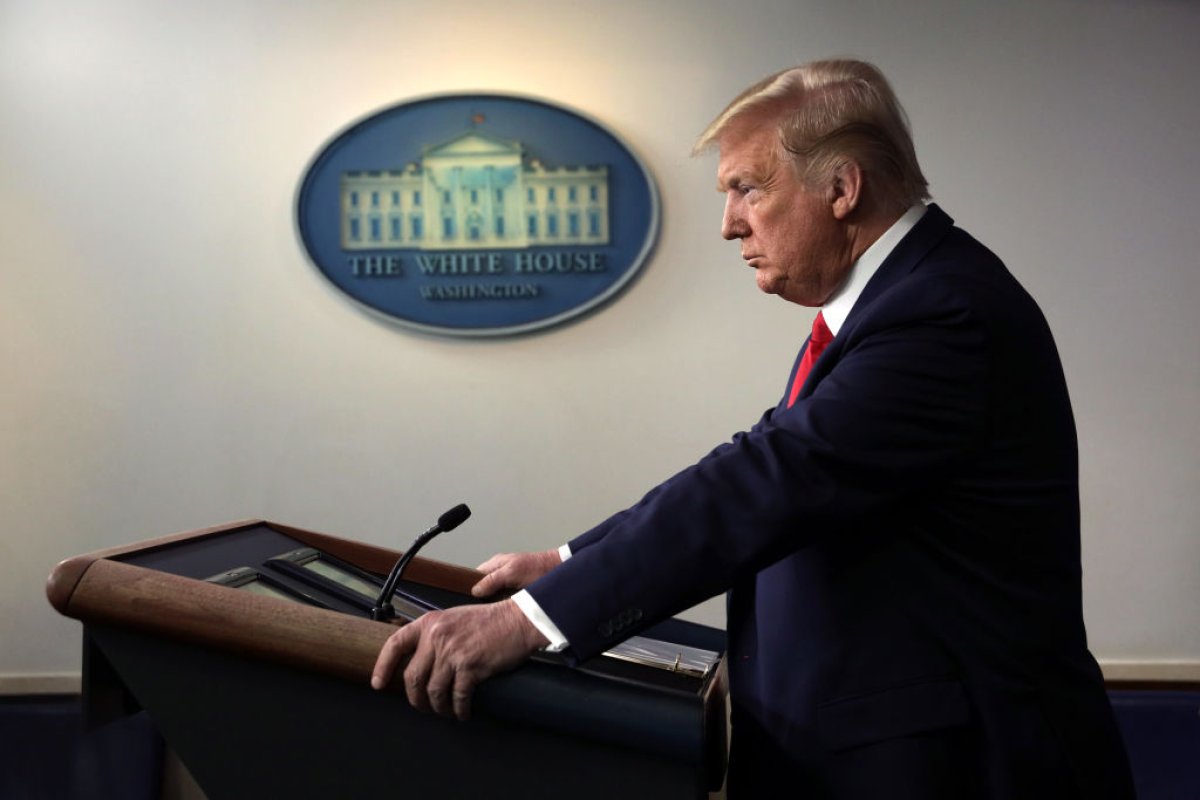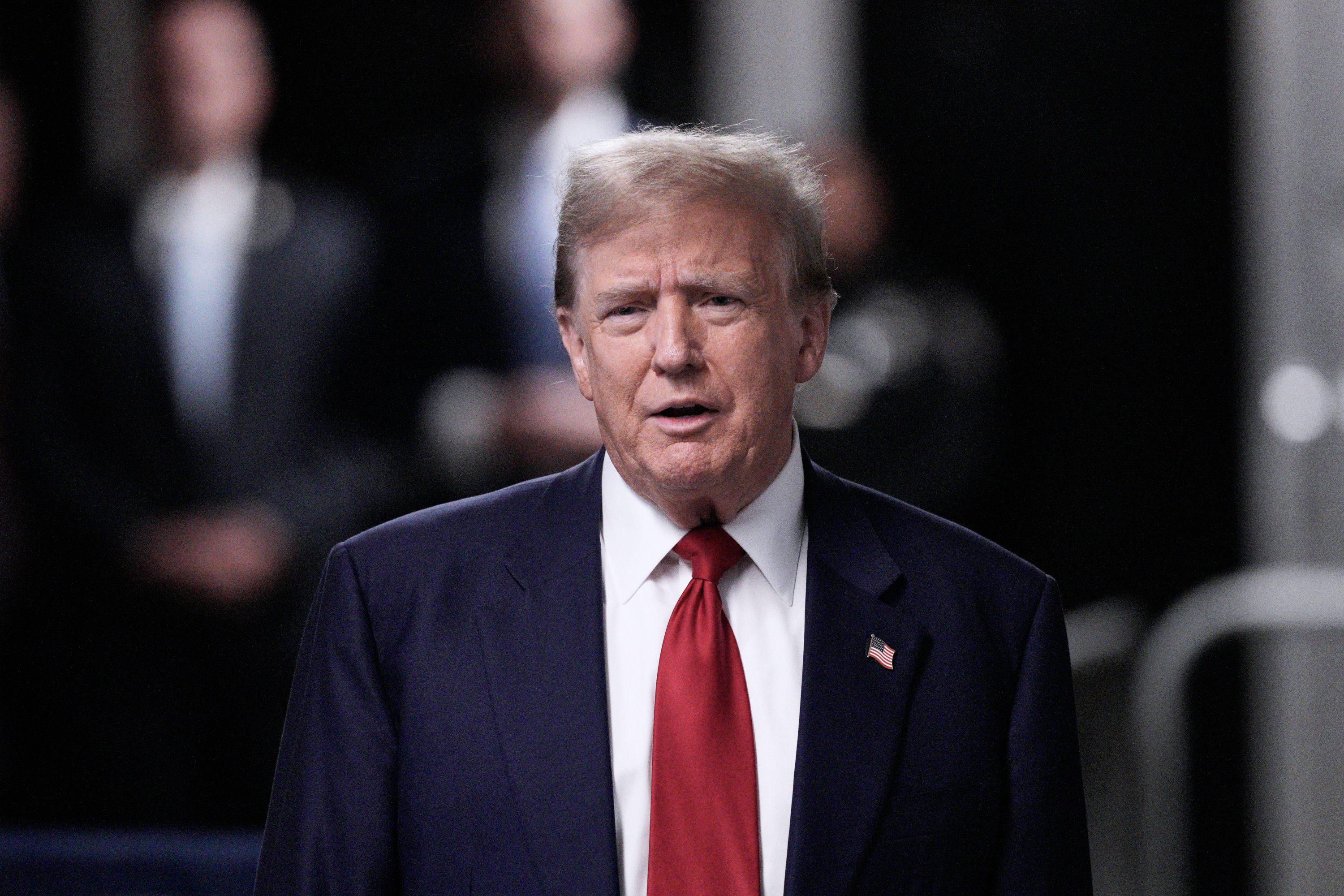Americans are split on President Donald Trump's handling of the ongoing coronavirus pandemic as his rating on the issue has slumped over the last few weeks, a new poll has found.
The new Morning Consult survey found that 49 percent of Americans either strongly or somewhat approved of his response to the COVID-19 outbreak.
A further 45 percent disapproved of his handling of the pandemic, giving him a net approval rating of 4 percentage points.
President Trump's rating on the issue was markedly better in mid-March, when pollsters revealed that 53 percent of voters approved of his handling of the outbreak, while only 39 percent disapproved.
Unsurprisingly, views on his performance differed hugely along party lines. Almost nine-in-ten Republicans (88 percent) said they approved of President Trump's handling of the pandemic.
By comparison, only 20 percent of Democratic voters backed his response to the outbreak, and 75 percent told pollsters they "somewhat" or "strongly" disapproved.
Independents were split almost down the middle on the matter, with 44 percent supporting the president and 43 percent opposing his handling of the pandemic.
President Trump's slumping coronavirus approval rating has coincided with a rise the number of confirmed cases in the U.S. At the time of writing, there have been more than 368,000 American cases of the novel coronavirus, as well as 10,993 related deaths and 19,919 cases of recovery.
But the decline in support for the commander-in-chief's reaction to the outbreak has also come as Congress and the administration have rolled out a series of relief measures for businesses and families hit by pandemic.
At the end of March, Trump signed off a $2 trillion stimulus package offering Americans individual checks and loans for businesses amid a sharp spike in jobless claims related to closures caused by the pandemic.
Shortly after the passage of the emergency bailout plan, the president also announced that social distancing rules would be extended until April 30—a move that his top coronavirus expert Dr. Anthony Fauci called "wise and prudent."
Yet it was around this time that Morning Consult pollsters found his net coronavirus approval rating slipping, with a survey conducted between March 31 and April 1 finding that 49 percent of Americans backed his response while 47 percent disapproved.
In its latest coronavirus tracking poll, Morning Consult found that Congress had a higher net approval rating than the president. Exactly half of Americans said they approved of lawmakers actions amid the pandemic while 35 percent disapproved and 15 percent said they were unsure.
Vice President Mike Pence recorded a similar net rating, with 46 percent approving of his response and 36 percent disapproving.
Meanwhile, pollsters found that public approval of actions taken by the Center for Disease Control and Prevent (CDC) and state officials was high.
Almost eight-in-ten Americans (79 percent) were happy with the CDC's reaction to the spread of the novel coronavirus, while a little under three quarters (74 percent) approved of their state government's response.
The Morning Consult poll was conducted between April 3 and April 3 with a sample of 2,200 American adults. Its margin of error stands at 2 percentage points.
Centers for Disease Control and Prevention Advice on Using Face Coverings to Slow Spread of COVID-19
- CDC recommends wearing a cloth face covering in public where social distancing measures are difficult to maintain.
- A simple cloth face covering can help slow the spread of the virus by those infected and by those who do not exhibit symptoms.
- Cloth face coverings can be fashioned from household items. Guides are offered by the CDC. (https://www.cdc.gov/coronavirus/2019-ncov/prevent-getting-sick/diy-cloth-face-coverings.html)
- Cloth face coverings should be washed regularly. A washing machine will suffice.
- Practice safe removal of face coverings by not touching eyes, nose, and mouth, and wash hands immediately after removing the covering.
World Health Organization advice for avoiding spread of coronavirus disease (COVID-19)
Hygiene advice
- Clean hands frequently with soap and water, or alcohol-based hand rub.
- Wash hands after coughing or sneezing; when caring for the sick; before, during and after food preparation; before eating; after using the toilet; when hands are visibly dirty; and after handling animals or waste.
- Maintain at least 1 meter (3 feet) distance from anyone who is coughing or sneezing.
- Avoid touching your hands, nose and mouth. Do not spit in public.
- Cover your mouth and nose with a tissue or bent elbow when coughing or sneezing. Discard the tissue immediately and clean your hands.
Medical advice
- Avoid close contact with others if you have any symptoms.
- Stay at home if you feel unwell, even with mild symptoms such as headache and runny nose, to avoid potential spread of the disease to medical facilities and other people.
- If you develop serious symptoms (fever, cough, difficulty breathing) seek medical care early and contact local health authorities in advance.
- Note any recent contact with others and travel details to provide to authorities who can trace and prevent spread of the disease.
- Stay up to date on COVID-19 developments issued by health authorities and follow their guidance.
Mask and glove usage
- Healthy individuals only need to wear a mask if taking care of a sick person.
- Wear a mask if you are coughing or sneezing.
- Masks are effective when used in combination with frequent hand cleaning.
- Do not touch the mask while wearing it. Clean hands if you touch the mask.
- Learn how to properly put on, remove and dispose of masks. Clean hands after disposing of the mask.
- Do not reuse single-use masks.
- Regularly washing bare hands is more effective against catching COVID-19 than wearing rubber gloves.
- The COVID-19 virus can still be picked up on rubber gloves and transmitted by touching your face.

Uncommon Knowledge
Newsweek is committed to challenging conventional wisdom and finding connections in the search for common ground.
Newsweek is committed to challenging conventional wisdom and finding connections in the search for common ground.
About the writer
To read how Newsweek uses AI as a newsroom tool, Click here.








